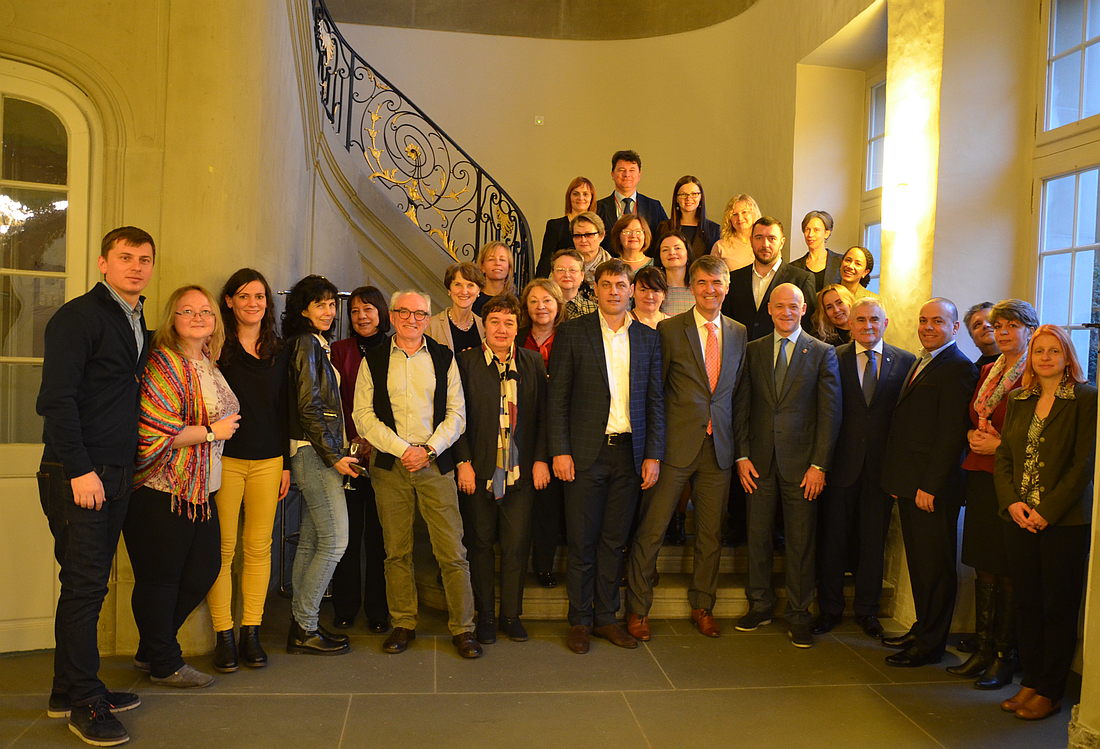On November 14th-17th, delegations from Balti, Chisinau (Moldova), Odesa (Ukraine) and Sofia (Bulgaria) conducted a study and knowledge-sharing visit to Bern (Switzerland) to learn about the experience and best practices in building successful and sustainable city models of responses to HIV in key populations. The group of 23 people included representatives of “Fast-Track TB/HIV responses for key populations in EECA cities” project implementing NGOs, partner NGOs, AIDS and TB services, City Health Departments, Members of City Councils, the police and representatives of the key populations.
During the study visit to Bern, licit, CONTACT, the city of Bern and other partners contributed their expertise in establishing a pragmatic and coherent drug policy on national, county and city levels; in innovative harm reduction interventions on HIV, HCV, night life, substitution, safe injection rooms, social enterprises, housing and cooperation with the police for more security in the public space; in the role in designing municipal and county funding and cooperation approaches to support harm reduction, HIV, TB and viral hepatitis interventions.
The delegations had an extensive agenda: the participants visited harm reduction NGOs, counselling centre for sex workers, work integration programs, clinic for addiction and substitution treatment, the Ministry of Health, Bern regional prison where condom, syringe distribution, and OST are available, a pharmacy where PWID have access to OST, a safe injection room, where people can consume drugs, and have access to other services including shower, laundry, healthy and tasty food, and counselling.
The study visit ended with a meeting with the Mayor of Bern, Alec von Graffenried, who stated that only cooperation between the Municipality, the police and NGOs could lead to such successes in response to the HIV/TB epidemic as in Bern.
Summarizing the study visit, the Mayor of Odesa Gennadiy Truhanov said: “We need to change the mentality and philosophy of our people. We will definitely use Bern experience and the changes that were made within the last 30 years with drug use and HIV to change the situation in Odesa for the better. Unfortunately, today we treat people who use drugs as criminals, but we should treat them as sick and addicted people”. Inspired by the Bern drug policy experience, the Mayor Truhanov promised to open a safe consumption room in Odesa that will become the first one in the EECA region.
The Mayor of Balti, Ihor Sheremet thanked the Mayor of Bern Alec von Graffenried for the fantastic drug programs that have been implemented in the city, and stated that implementing them in Balti will be much easier because Balti needs only to ‘copy and paste’ the 30-year experience of Bern. Mr Sheremet promised to share with the Mayor of Bern an action plan to open a safe consumption room in Balti.
Irena Dimitrova from Sofia Municipality in her speech emphasized that the delegation from Sofia during the study visit was really impressed with the scope and the level of services offered to the members of key populations in Bern and said that she hopes that upon her return to Sofia she will be able to ensure that the services for drug users are more patient-centered. She also hopes that Bulgaria will be able to achieve the same level of cooperation between the municipality, the law enforcers and the NGOs as in Bern.
“Fast-Track TB/HIV responses for key populations in EECA cities” project will further support the cities in implementing their ambitious plans during 2018-2019.
“Fast-Track TB/HIV responses for key populations in EECA cities” is the Global Fund funded EECA regional project of Alliance for Public Health (Ukraine), AFEW International (The Netherlands), licit and Stop TB Partnership (Switzerland) under technical guidance of UNAIDS EECA office which is there to support city responses to HIV and TB in key populations in the five cities of EECA: Almaty (Kazakhstan), Balti (Moldova), Odesa (Ukraine), Sofia (Bulgaria) and Tbilisi (Georgia). The project will be implemented throughout 2017-2019 and plans to develop efficient and sustainable city models of HIV/TB responses that would allow to reduce AIDS and TB mortalities in the project cities as well as increase the allocation of city funding to HIV/TB interventions for key populations.

